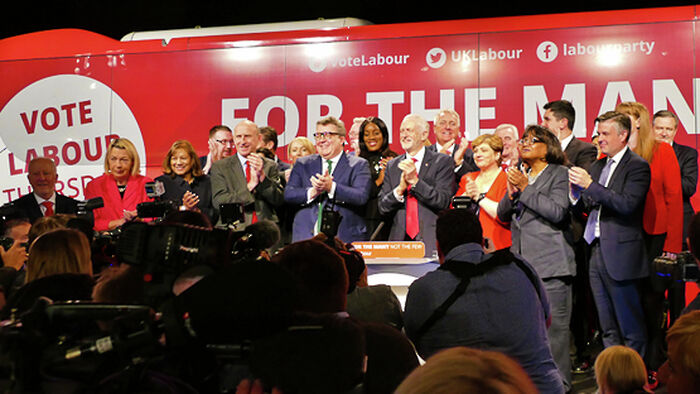Cliff-edge politics: why talk of a no-deal Brexit is so dangerous
Brexit columnist Tom Nixon explains the latest developments in the process, and says a ‘no-deal’ Brexit would be disastrous

Recent statements by some Conservative MPs suggest that sections of the party are more than willing to leave the EU with no Brexit deal at all. Crashing out of the EU with no deal would be a disaster for Britain in almost every conceivable way and this dangerous talk is a reflection of the impetuous, gung-ho attitude that has always characterised the Brexit movement.
In a recent letter to the Prime Minister, four ex-cabinet ministers, including Owen Paterson, John Redwood, Lord Lawson and Peter Lilley, all called upon the Prime Minister to make preparations for leaving the EU without any deal. They have argued that we should default to WTO (World Trade Organisation) tariffs, saying that this would “crystallise the economic opportunities” of Brexit and give “absolute certainty” to businesses.
In many ways they are right. Leaving with no deal would indeed “crystallise the economic opportunities” of Brexit: it would fully demonstrate the void left by tariff-free access to our largest and closest market. It would also give “absolute certainty” to businesses. They can expect higher tariffs and more red tape rather than less, as was illogically claimed by Brexiteers. Defaulting to WTO rules would mean significant hikes in tariffs for almost all trade with the EU. This would be a massive hit to the economy, especially as the WTO deals solely with tariffs on goods and not agreements on services companies. There would be no provision for the services industry to function in the EU. This is especially bad for Britain, a country whose service sector is almost 80 percent of its GDP.
This demand to leave without a deal seems partly due to frustration with the Brexit process itself. It is almost as if Brexiteers are only just discovering how complex a task they have embarked on. The childish impatience with a process that they argued for shows a lack of foresight and a disregard for the potential dramatic impact of the no-deal cliff edge. These MPs are in the contradictory position of arguing both that the EU wants a deal because without one their economies would be damaged, but also that the UK could leave without one and be unaffected. Worryingly, it is not just groups of backbench MPs but current senior ministers who are suggesting leaving with no deal is a genuine option.
In response to Emmanuel Macron’s claim that the UK government was bluffing by talking about a no-deal exit, Liam Fox, the international trade secretary, insisted that it was an option under real consideration. He said that he would prefer to reach a deal with the EU but that he was not scared of leaving without one. Philip Hammond, the Chancellor, has even been pushed to set aside more money to prepare for a no deal, but has resisted these attempts publicly. The cabinet is paralysingly split on this issue.
This push to the cliff edge comes at a time when business and industry leaders are deeply concerned by lack of progress towards a transition agreement. Britain’s five biggest business lobby groups have warned that with continued uncertainty the UK risks losing jobs and investment. The director-general of the Confederation of British Industry, Carolyn Fairbairn, spoke to the BBC and said, "This is real, this is urgent and a transition agreement by the end of the year would help enormously to keep investment and jobs in the country.” Businesses not only need a period of transition, but they need certainty on that deal as soon as possible. The claim that a no-deal Brexit would be an acceptable choice clearly goes against the interests of businesses across the UK, a group that the Tory party has always claimed to represent.
The government should be prioritising ensuring that the Brexit negotiation's cogs keep turning and that a transition period is secured. The claim from government ministers that the UK could, and perhaps even should, leave the EU with no deal is a dangerous suggestion. It is either an attempted bluff to persuade the EU that we could walk out at any time, or simple pandering to the frustrated Brexiteers that hold so much sway in the Tory party since the loss of the majority. Either way, this kind talk is at best destabilising and at worst potentially disastrous. The possibility that we could leave the EU without a deal is a perilous thought indeed
 News / Cambridge academics stand out in King’s 2026 Honours List2 January 2026
News / Cambridge academics stand out in King’s 2026 Honours List2 January 2026 Interviews / You don’t need to peak at Cambridge, says Robin Harding31 December 2025
Interviews / You don’t need to peak at Cambridge, says Robin Harding31 December 2025 Comment / What happened to men at Cambridge?31 December 2025
Comment / What happened to men at Cambridge?31 December 2025 News / Varsity’s biggest stories of 202531 December 2025
News / Varsity’s biggest stories of 202531 December 2025 Features / “It’s a momentary expression of rage”: reforming democracy from Cambridge4 January 2026
Features / “It’s a momentary expression of rage”: reforming democracy from Cambridge4 January 2026










